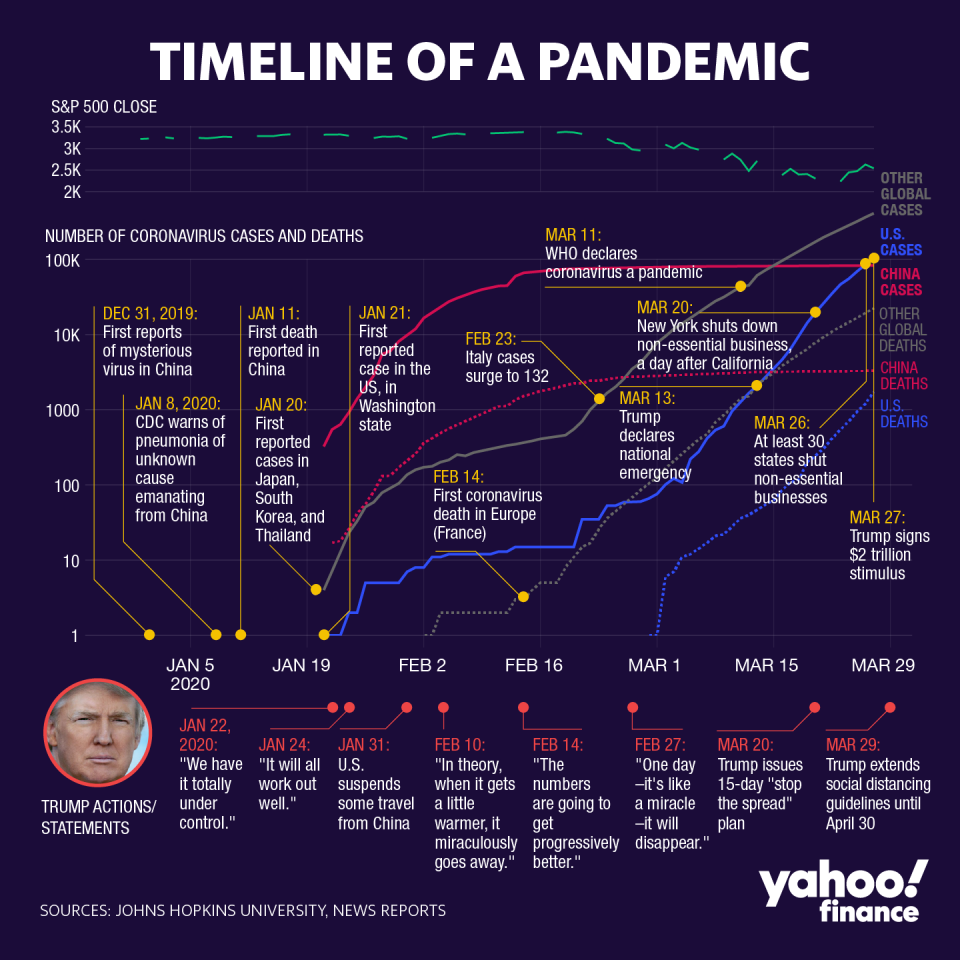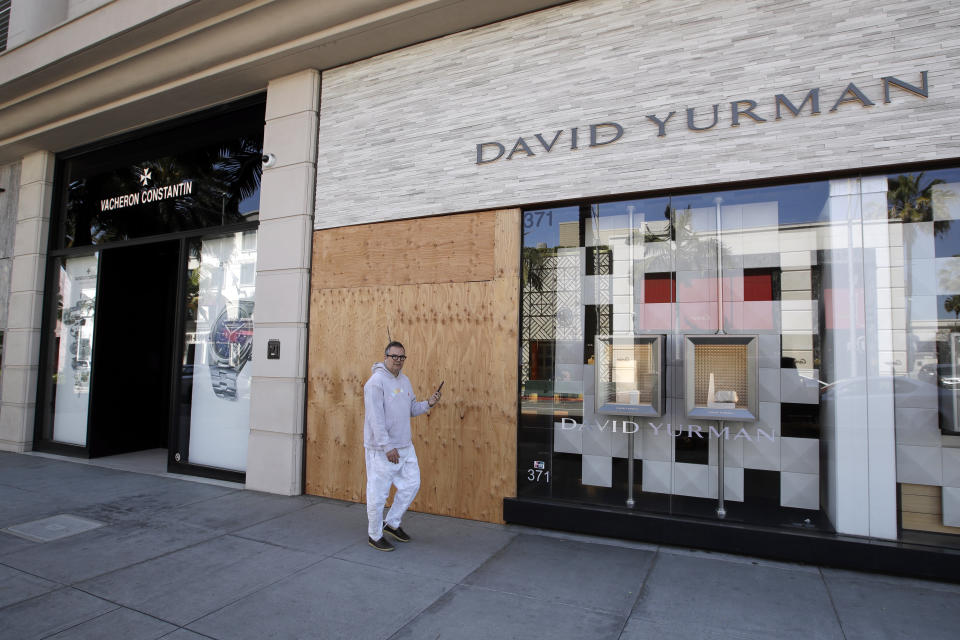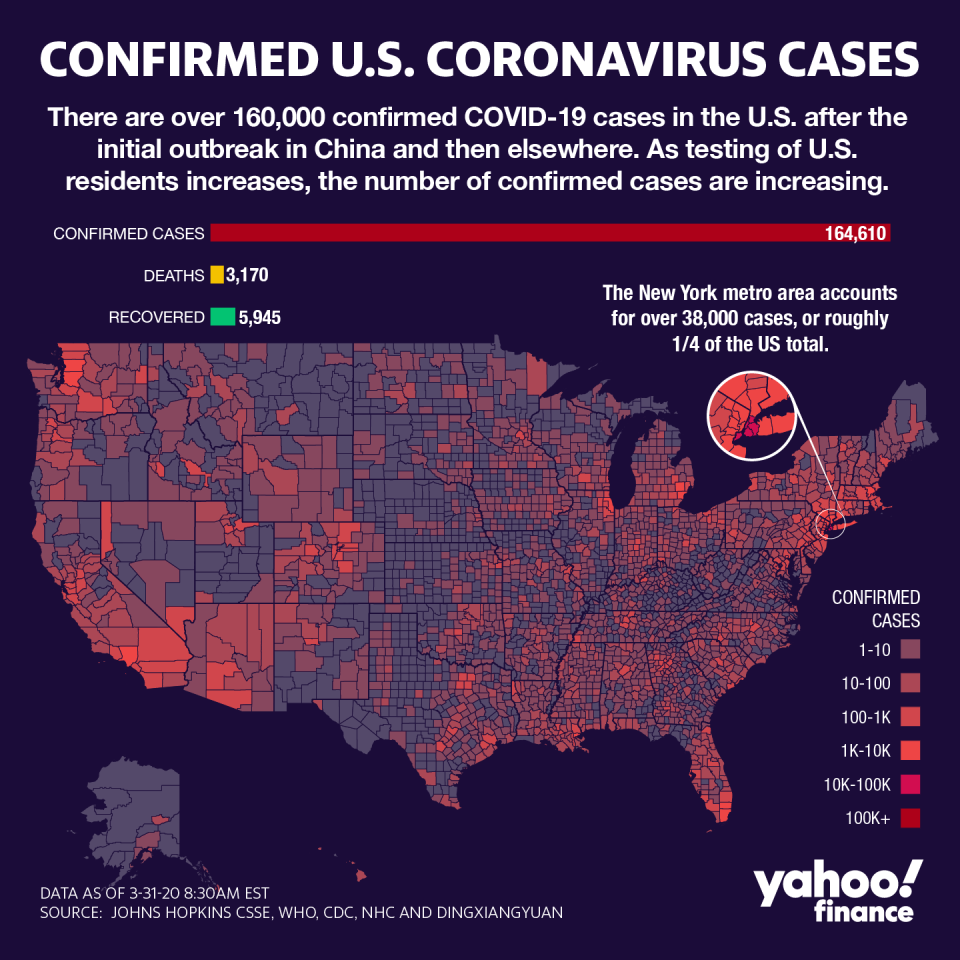Coronavirus deaths will far outnumber Trump’s recession deaths
President Trump is right: recessions kill people. As with many things, however, he overstates the problem and draws flawed conclusions by misinterpreting the data.
Trump is grappling with when to “reopen” the economy amid the coronavirus pandemic, as businesses shut down and millions lose their jobs. Trump has said several times that “we cannot let the cure be worse than the problem itself,” suggesting it might be better to reopen some businesses, even if it means more infections and deaths. “You’re going to have suicides by the thousands,” Trump said on March 25. “You have suicides over things like this when you have terrible economies.”
The death toll from a recession, however, will likely be far lower than the cost of relaxing measures to restrain the coronavirus. Economists estimate that during a recession, there’s one additional death for every $100 million in lost national income, according to Kip Viscusi, a law professor at Vanderbilt University and longtime authority on regulatory economics. Foregone wages, lost health insurance, financial stress and other factors make people less healthy and more despondent, raising fatality rates.

Under current projections for the economy this year, a recession might cause 10,000 additional deaths. IHS Markit forecasts a 5.4% decline in GDP in 2020, followed by a recovery in 2021. Personal income totaled $18.6 trillion in 2019, so if personal income were to fall by the same amount as GDP, that would be a loss of about $1 trillion, leading to roughly 10,000 recession-related deaths. If growth and income were to fall by twice as much, it could cause 20,000 deaths. And total personal income might not fall at all, since government stimulus checks, unemployment insurance and other measures will plug some of the shortfall.
The case for keeping the economy closed
A worst-case outcome in the coronavirus pandemic could entail 2.2 million U.S. deaths, according to British research the White House seems to agree with. That’s with no effort to contain the virus, so the actual toll should be lower. Dr. Anthony Fauci, the top government expert on infectious diseases, says the best outcome might be 100,000 to 200,000 U.S. deaths. If it were as simple as policymakers choosing from one policy that caused 10,000 deaths and another that caused 100,000 or more, the choice would be obvious.
The case for keeping the economy closed to halt the spread of the virus gets stronger still when accounting for the economic cost of the deaths the virus could cause. When evaluating the impact of government policies that affect public health, analysts place a statistical value of about $10 million on each human life. That number comes from widely accepted methodology based on real-world data showing extra wages required to compensate workers for an increased risk of dying on the job. “This is the approach that all government agencies use to evaluate policies that affect mortality risks,” says Viscusi. “You look for areas where you get the greatest impact in terms of reduced health costs for every dollar of disruption you’re inflicting.”

The cost-benefit equation using the $10 million figure suggests it’s worth doing whatever it takes to limit the spread of the virus and reduce deaths. If the difference between the worst-case scenario, 2.2 million deaths, and the best-case scenario, 100,000 deaths, is 2.1 million lives saved, then the best-case outcome will have preserved $21 trillion worth of human capital. The huge stimulus bill Congress just passed involves a mere $2.2 trillion in new spending, by comparison.
Heavier costs from coronavirus deaths
This is obviously imprecise, because the worst-case outcome is theoretical and we still don’t know what the actual outcome will be. But even if you change assumptions, the case for an economic shutdown remains strong. If an aggressive response saves 1 million lives instead of 2.1 million, it would still preserve $10 trillion worth of human capital. Saving 500,000 lives would preserve $5 trillion, and so on.
By the same token, the economic cost of 10,000 recession deaths, at $10 million apiece, would be $100 billion. If that rose to 20,000 recession deaths, the cost would be $200 billion. While unsettling and regrettable, those deaths and the economic cost associated with them would still be far lower than the likely cost of the coronavirus.

The Trump administration does have some control over the depth and duration of a recession, and can take steps to limit the human and economic cost of shutting down the economy. The sooner the virus is contained, the sooner businesses can reopen and people can get back to work. Trump has extended federal social distancing guidelines through the end of April, and there’s a good chance they’ll have to extend them through May and perhaps June as well.
With a vaccine for the virus at least a year away, reopening business and letting people get back to work requires testing on a massive scale, to determine who’s infected and who’s healthy. If we can know that in real time, more or less, we’ll know who can move about safely and who has to be quarantined until they’re better. Yet testing remains inadequate nationwide, and far below the per-capita rate in South Korea, which appears to have slowed or even stopped the spread of the virus. Trump, seems unaware of this, saying on March 30, “I haven’t heard about testing being a problem.”
Rick Newman is the author of four books, including “Rebounders: How Winners Pivot from Setback to Success.” Follow him on Twitter: @rickjnewman. Confidential tip line: [email protected]. Encrypted communication available. Click here to get Rick’s stories by email.
Read more:
Follow Yahoo Finance on Twitter, Facebook, Instagram, Flipboard, SmartNews, LinkedIn, YouTube, and reddit.
